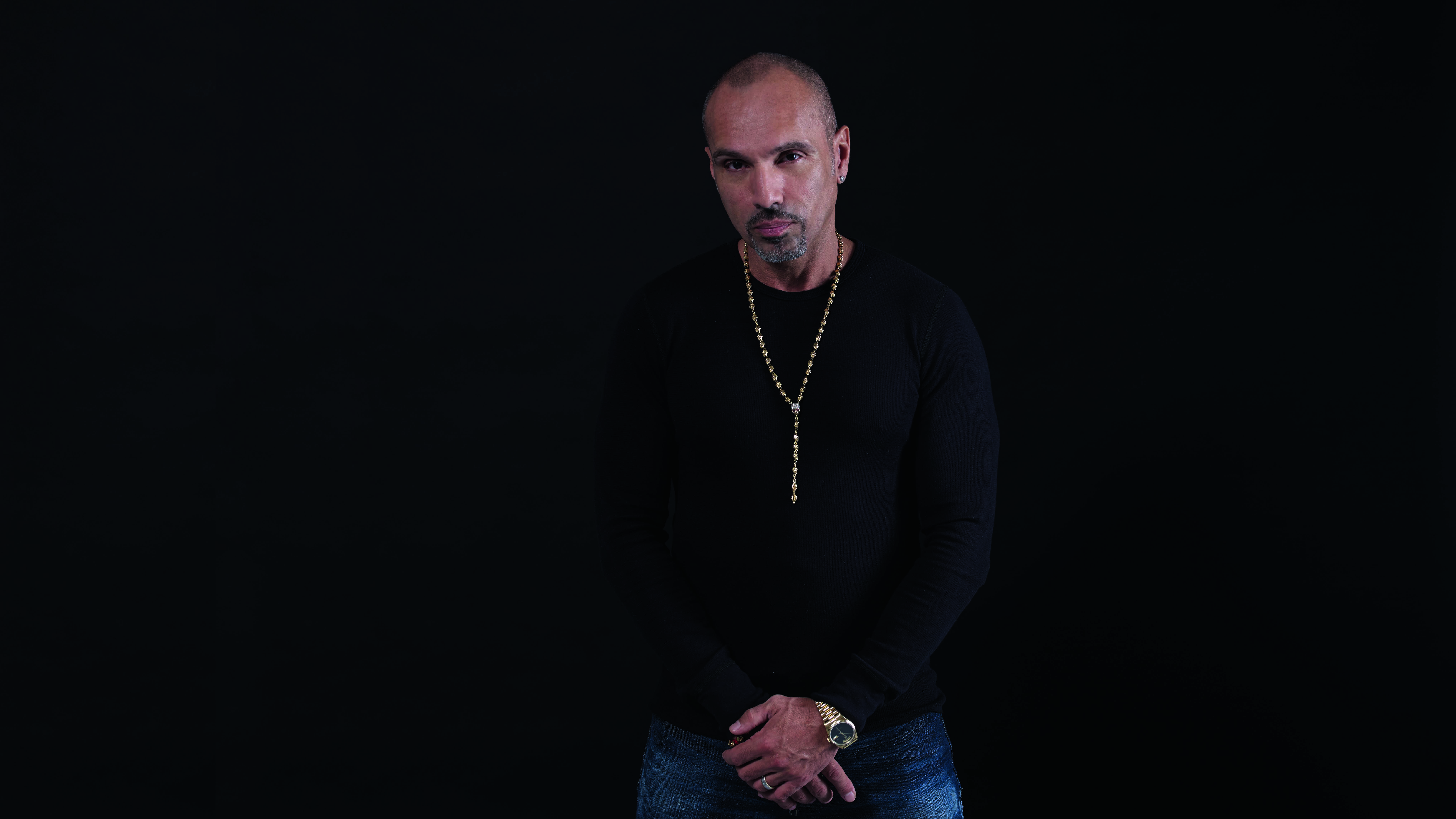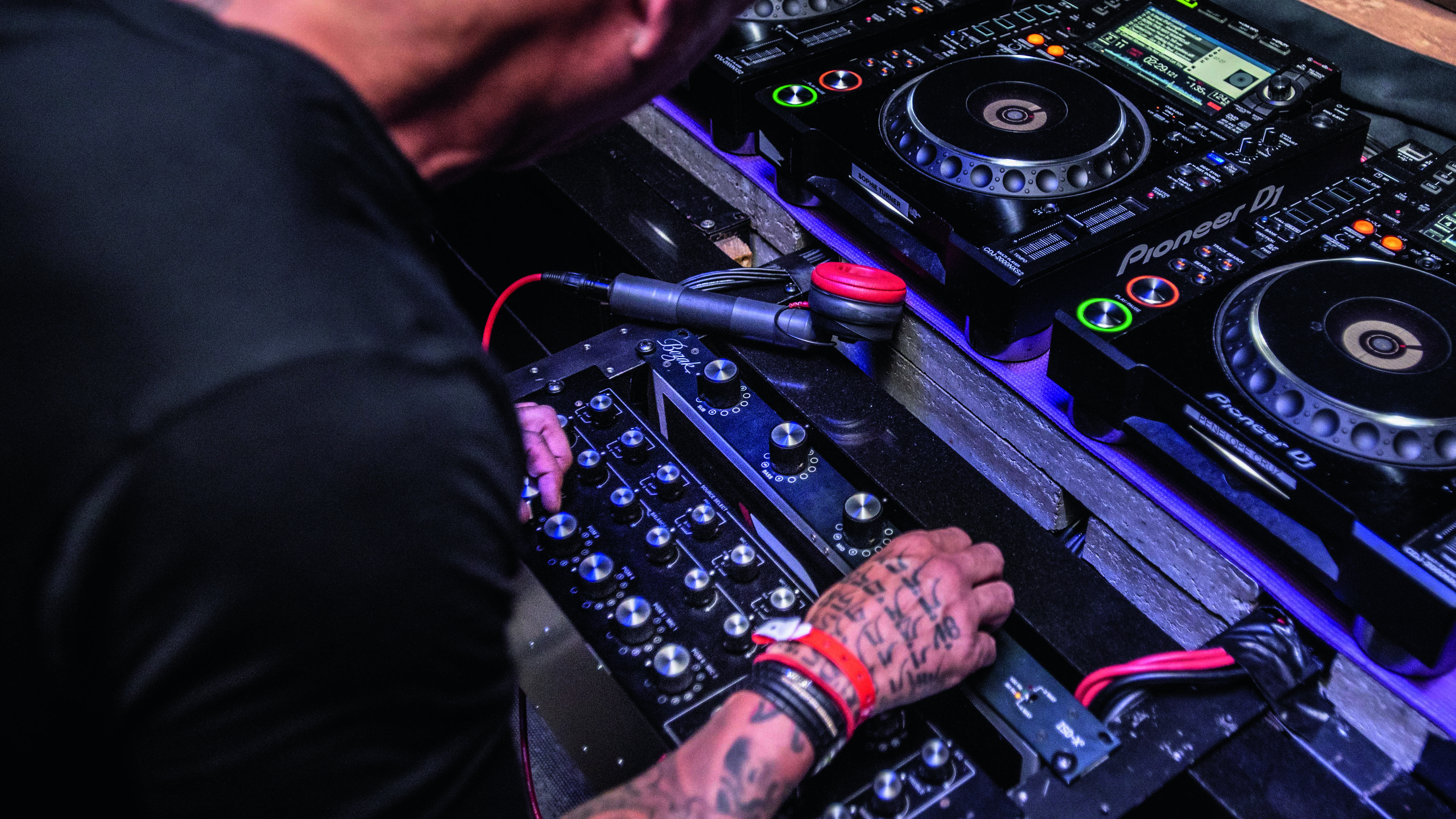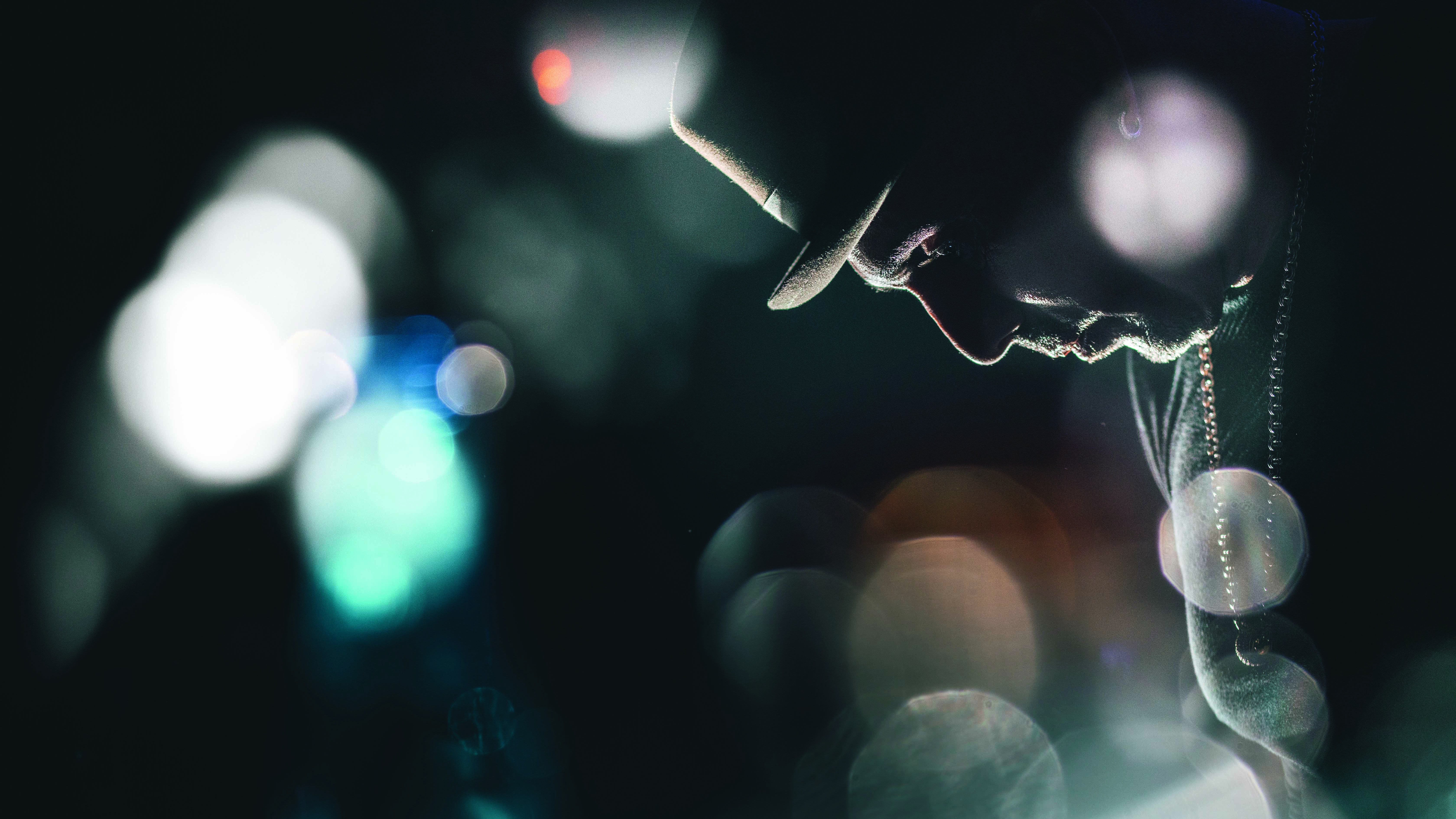David Morales: "Back at the start, all you needed was a melody and a groove. That’s the exact same s**t that you need today!”
The legendary DJ, producer and remixer extraordinaire looks back at 35 years of house

“House music! You want me to tell you about house music?” David Morales furrows his brow, scratches his stubbly chin and finally shakes his head in defeat. “How can I tell you about something that is now so big that it figures in the DNA of 99% of all club music? House music is so big that it means nothing, and so big that it means everything! Y’understand what I’m saying? It’s just… music. It’s house. It’s my life!”
David Morales was there at the beginning. OK, he wasn’t actually in Chicago, where house music was finding its groove in the early 1980s, but Morales was definitely picking up the vibrations 800 miles away in New York City. He heard this new music, all made by machines, and he liked it. At this point, he’d been DJing for several years – he started at 13! – and as house music began to make its mark, so did Morales. He was sharing the DJ booth with the likes of Tony Humphries, Larry Levan and Bruce Forest. Gigging at legendary clubs like the Paradise Garage and Club Zanzibar… clubs that, along with what was happening in Chicago, eventually helped to shape the sound of house music.
During the '80s and '90s, Morales’ DJ reputation was put to work in a studio, remixing for… well, just about everybody you can think of. Have a look at his CV and you’ll see Bjork and Madonna, Jamiroquai and the Spice Girls. There was a lot of money to be made… and Morales made that money. Back then, you could have probably rustled up a decent Saturday night house set just from Morales remixes.
He didn’t release a record of his own until 1988. Do It Properly was credited to 2 Puerto Ricans, A Blackman And A Dominican. “I was one of the Puerto Ricans,” laughs the 56-year-old former Brooklyn kid. “We made that record on a little DX100 keyboard and two record decks. Plus a lot of tape editing.”
Although the remix work has calmed down quite a bit, he’s still just as busy in the studio, banging out his own tunes. Obviously, 1998’s Needin’ U is the one that everybody remembers, but recent releases like There Must Be Love still have that classic Morales magic. And, over 35 years into his career, he’s still very proud to call it house music.

Can you remember the first house record you heard?
“I can remember the first one I bought. 1985. It was Music Is The Key by JM Silk, which was Steve Hurley and Keith Nunnally on vocals. I even booked them to play at the club night I was running at the time.
Get the MusicRadar Newsletter
Want all the hottest music and gear news, reviews, deals, features and more, direct to your inbox? Sign up here.
“The thing about house – the thing that made it sound different – was that this was music made by machines. Club music. Dance music. Yeah, there were vocals on top, but the music had a completely new feel. Nothing else like it was out there at that point. It was soul music with a groove. There were all sorts of bands that used synths, but this was off in another direction, and it was being pulled along by that 4/4 beat.
“Those early Chicago tracks sounded real raw, too. You should go back and listen to them. There’s nothing polished or fancy going on there. It was underground. Dirty. A couple of guys with a drum machine, a synth and a four-track. It wasn’t being filtered through the big record companies. It wasn’t being cleaned up for mass consumption. There was Trax Records and DJ International, both based in Chicago and both bringing songs directly from the bedroom to the dancefloor.
“That sound was created, for the most part, by the TR-909. There were quite a few drum machines on the market – the 808, the Linn, the DMX – but it was the 909 that we all wanted. To a certain extent, the 707 and the 727, as well. The 727 had the Latin percussion set. The 909 had that thick snare. And you could tweak the sounds, too.
“The drum machine was so important that you began to see them as different characters. Each machine had its own sound. And because they were analogue, every 909 sounded different. Every 707 sounded different. They had a different feel. Even if you took every drum machine and chained them together with the Roland SBX-80 sync box, then fired off a kick drum from each one at the same time… the kicks would vary. There would be slight delays. Nothing was standard.
“The drum machine did much more than keep time. It could define your song.”
House came from Chicago, but it didn’t take long for New York to get on board.
“The DJ scene and the club scene was so much more communal back then. We were all on the same team. If somebody had a hot new record from Chicago, they would make a copy on cassette or reel-to-reel and give it to their friends. You never heard people saying, ‘This is mine. You can’t have it’.
“I think that’s why the sound caught on so quickly in New York – and over in the UK, too. We all wanted to share this wonderful music that we’d found. Of course, this was in the days before egos took over things. I’m worried that today’s kids see a DJ or a producer, and see him in front of the crowd. They think it’s about fame and money, when it should just be all about sharing the music.”
You started DJing way before you thought about making your own music.
“I was DJing from age 13, and played my first party at 15. This was a friend’s apartment and we waited till his parents had gone to work, then we brought in my decks and a sound system. This is 9 o’clock in the morning, when we were supposed to be at school. From there, I moved on to bigger apartments, where we’d charge a dollar for entry.
“The main thing that you’ve got to realise here is that being a DJ was no big deal. You play records? No one really cared. There was no DJ ‘culture’. I was just a kid who loved music. I had mismatched turntables that I bought with my pocket money and a battery powered mixer. No speakers – I couldn’t afford them.
“I couldn’t afford records, either, but that didn’t stop me hanging out at the record store. I used to pass a couple on my way to and from school, so I used to go inside and listen to the latest records. After a while, the guys got to know me and saw that I wasn’t there to steal. I became part of the club; part of the community. Eventually, they’d start getting a little stack of records ready for me. ‘Hey, kid. Check this out.’ I was part of something. But I wasn’t doing that because I wanted to be famous… I was doing it because I had nothing else to do with my time. I didn’t care about TV. We didn’t have video games. I went to the record store because that was all I had in my life.
“And that’s where I think we’re going wrong, today. When we buy records, we are no longer in the same room as each other. You buy records while you’re sitting on the sofa watching a movie. Music is more important than that. It demands your full attention. And it works better when it’s people together… exchanging real words and emotions. Like you do when you’re in a club.”
Even after you’d made your name as a DJ and a remixer, you didn’t seem keen to make your own music. How come?
“Too f**king busy! Making good money! Having the time of my life! Remixing gave me a creative outlet. The rules were pretty clear. You were given the tapes, you went into a fancy, 48-track SSL studio, and you added an intro, a break and an outro. Maybe a bassline or a bit of percussion. That was my apprenticeship. I was listening to songs and trying to work out what they needed to make them work in a club. I was learning about tape editing. Physically cutting up tapes.
“At some point, you’re gonna say, ‘I know what makes a good song. I want to write my own music’. I didn’t play an instrument, but that didn’t matter. The music was in my head. The crazy thing is that I still would like to learn the piano. I have a weighted keyboard in my studio and I always think about taking lessons. Maybe that would spoil what I’ve got. I can’t play drums. I can’t play congas. But I program them pretty good. It ain’t broke, so why fix it?”
What’s the setup today? Is there a Morales studio?
“When I lived in New York, I had a big studio, but it was inside my house. All the gear, all the synths, a big desk… and my engineer used to live in the house with me. I liked the idea that everything was being looked after under one roof.
“Now, I have a little room about five minutes away. But do we call it a studio? It’s got my souped-up MacBook Pro, some nice monitors and a little keyboard. Man, I remember going into some studios – back when I was remixing and paying two or three hundred dollars an hour! – and the place was full of keyboards and compressors and s**t. Now, it’s all about plugins. I’ve got everything on there: Arturia, Spectrasonics, Korg, Applied Acoustic Systems, Native Instruments.
“Battery is my number one tool for drums. With a little bit of help. I’m not ashamed to admit that I still sample from other people’s records. Little bits of rhythm. I’m not talking about the whole loop being used as the basis of my song. Just little bits of sound and the odd groove that will sit underneath the track. Is it stealing? No, it’s art!”
The main thing that you’ve got to realise here is that being a DJ was no big deal. You play records? No one really cared. There was no DJ ‘culture’. I was just a kid who loved music.
And your main DAW?
“I never liked Pro Tools. I should get into Logic, but I haven’t… yet. Ableton Live is where I’m at. It’s the full package. If I’m just working on an underground track that will get a limited release, I can finish the whole thing in Ableton. As long as there’s not too much going on in the mix, anyway.
“If it’s a full release, I don’t master them myself. Over the years, I’ve come to realise that you can easily fall into the trap of just making everything louder. Especially when you’ve got a lot of different sounds working against each other. Turn that up… oh wait, now I have to turn that up too. It sounds like you’re adding more power, but you might as well just turn your monitors up.
“You also have to be careful with mastering engineers. Sometimes, they make things too nice. A lot of clubs tracks need that raw feeling to make them work.”
Like those early house tracks you were talking about. If we stepped back in time, what are the tracks you’d want to listen to? What are the tracks that defined that early house sound?
“Are you kidding?! How many do you want me to mention? Two hundred? A thousand? So many great records.
“Marshall Jefferson, Move Your Body (The House Music Anthem). Jesse Saunders, Love Can’t Turn Around. JM Silk, Music Is The Key. Steve ‘Silk’ Hurley, Jack Your Body. Adonis, No Way Back. Mr Fingers, Mystery Of Love. Hercules, 7 Ways To Jack. Of course, Jungle Wonz and Time Marches On. Oh, God… Robert Owens, Liz Torres, Ralphi Rosario. I could do this all day.”
When people mention ‘house’ music today, what do you think about? What does it mean in 2019?
“If you ask a young kid about house music today, they won’t know what you’re talking about because house music means so many things. Some DJs and producers have fallen out of love with house. They feel that they’ve got to be on every new train that comes through the station. They worry that they’re not cool unless they’re playing EDM or trap or whatever the hell you wanna call it.
“To me, those labels don’t matter. EDM, trap, electro, trance, techno… it started life as house. Without house, the music industry would have a lot of very big holes.”

The David Morales guide to house
From a production point of view, what were the most important elements of those early house tracks for you?
“Well, let’s take a song like Music Is The Key by JM Silk. A very early track that was released in 1985 on DJ International Records. What you’re hearing there is ‘synthesiser music’; ‘synthesised sound’. First, all the drums were programmed with a Roland 909 drum machine. To my knowledge, no one had done a club record with just a 909. It had its own, unique sound. Then you take the music. All of that was made with synthesisers… basic sounds, basic melodies. I’m sure that the producers went to a raw studio and recorded the record. Simple as that. Put it all together and you’ve got a new sound. It was something fresh in clubland. Stepping away from the idea of writing a commercial ‘hit’. House music back then was underground.”
How easy is it to recreate that old school feel with today’s tech? Is it all about the right drum sounds? Keeping the arrangement simple? Keeping that rawness?
“All of the above really. For most of my Red Zone mixes, I try to keep it raw… and, by that, I mean that I mix it myself right out the box. Some tracks I give to my engineer to mix, but if I want to keep it raw, I’ll mix it myself because my mixing style is very simple. And besides, I don’t really consider myself an engineer. Some might see that as a problem! Why? I seem to have done OK. A good house tune is about the sound, it’s not about technical perfection.”
How has the house sound changed over the years? As tech has improved, have songs become more complex... more polished? A tendency to pack more sounds into each mix? Does a great house song need a bit of space?
“We are now in 2019. Both technology and music have evolved. And so much of today’s music has evolved from the original house sound. So, to answer your question, there is no formula to house music. Today is today. The past is the past.”
In the studio, what are your top three tools for creating a killer house tune? Where do you get your basslines from? Your drums?
“I just use plugins now because I do everything in the computer. You don’t need the 909 and 707 now. You just get a plugin with all the sounds from all of the vintage drum machines. Battery is my main drum tool and it’s probably the one plugin that I use the most. When it comes to basslines, I might pull up something from Arturia – maybe the Mini V – and play it myself, but sometimes, I leave it to the musicians I work with.”
Pick a track that typifies today’s house sound.
“Oh, man! That’s a tough question. There are so many good songs out there and so many good producers. These days, everybody works in different ways. I always start with the kick, but other people start out with just chords or a bassline. Right back at the start, all you needed was a melody and a groove. That’s the exact same s**t that you need today!”
David Morales’ Escape is out now on DIRIDIM


Computer Music magazine is the world’s best selling publication dedicated solely to making great music with your Mac or PC computer. Each issue it brings its lucky readers the best in cutting-edge tutorials, need-to-know, expert software reviews and even all the tools you actually need to make great music today, courtesy of our legendary CM Plugin Suite.
“I’m looking forward to breaking it in on stage”: Mustard will be headlining at Coachella tonight with a very exclusive Native Instruments Maschine MK3, and there’s custom yellow Kontrol S49 MIDI keyboard, too
“Turns out they weigh more than I thought... #tornthisway”: Mark Ronson injures himself trying to move a stage monitor










